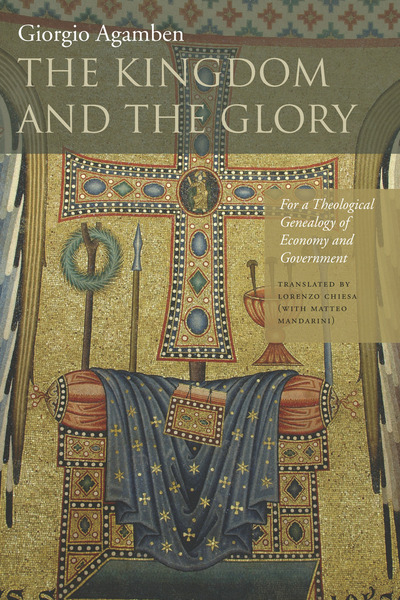
2011
328 pages.
from $28.00
Hardcover ISBN: 9780804760157
Paperback ISBN: 9780804760164
Ebook ISBN: 9780804781664
Why has power in the West assumed the form of an "economy," that is, of a government of men and things? If power is essentially government, why does it need glory, that is, the ceremonial and liturgical apparatus that has always accompanied it?
In the early centuries of the Church, in order to reconcile monotheism with God's threefold nature, the doctrine of Trinity was introduced in the guise of an economy of divine life. It was as if the Trinity amounted to nothing more than a problem of managing and governing the heavenly house and the world. Agamben shows that, when combined with the idea of providence, this theological-economic paradigm unexpectedly lies at the origin of many of the most important categories of modern politics, from the democratic theory of the division of powers to the strategic doctrine of collateral damage, from the invisible hand of Smith's liberalism to ideas of order and security.
But the greatest novelty to emerge from The Kingdom and the Glory is that modern power is not only government but also glory, and that the ceremonial, liturgical, and acclamatory aspects that we have regarded as vestiges of the past actually constitute the basis of Western power. Through a fascinating analysis of liturgical acclamations and ceremonial symbols of power—the throne, the crown, purple cloth, the Fasces, and more—Agamben develops an original genealogy that illuminates the startling function of consent and of the media in modern democracies. With this book, the work begun with Homo Sacer reaches a decisive point, profoundly challenging and renewing our vision of politics.
About the author
Giorgio Agamben, an Italian philosopher and political theorist, teaches at the IUAV University in Venice and holds the Baruch Spinoza Chair at the European Graduate School. His most recent works available in English translation from Stanford University Press include "What is an Apparatus?" and Other Essays (2009), Nudities (2010), and The Sacrament of Language(2011).
"Agamben's argument is complex, multifaceted, and comprehensive, and, indeed, it offers a useful model His method is a philosophical archaeology that joins philosophy and philology in seeking those moments in history in which concepts are formulated or significantly altered and then order subsequent modes of discourse and thought with long term ramifications for human society."
—Kelly C. MacPhail, Topia